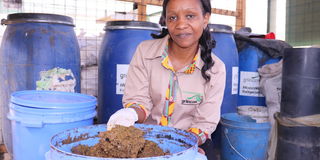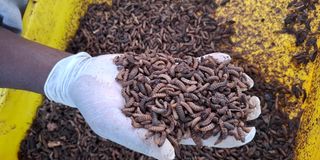Sustainable farming: Nakuru East farmer turns waste into protein-rich animal feed and fertiliser

Mildred Day, founder of Griincom Innovate Limited. She holds out some of the finely crushed organic waste, which has yet to be fed to the BSF first instar larvae. The waste is given at a ratio of 7-8 kg of crushed feed to 10 grams of larvae.
Every month, Mildred Day can be found at the Nakuru Free Area market, not to buy food like most shoppers, but to collect waste.
Her aim is clear: to take the waste back to her farm, where she and her team have developed a waste management system that turns the collected waste into affordable animal feed and fertiliser.
Mildred collects up to 30 tonnes of waste a month, which is processed by the Black Soldier Flies (BSF) she breeds into protein-rich food for farm animals.

Black soldier fly larvae at its pre-pupal and pupal stage.
"Waste is a constant and as the population grows, so does waste in urban areas. We offer sustainable solutions for urban life. We recognised waste as a valuable resource and saw the potential to extract fertiliser and protein from it, helping to address waste management and the need for sustainable agricultural inputs," says Mildred.
She explains that Black Soldier Flies play a key role in sustainable agriculture.
BSF larvae contain 35 to 45 percent protein, which can be used to feed poultry, fish and livestock. This provides a more affordable and sustainable alternative to the rising cost of commercial animal feed.

George Mmbaka, the general manager fertiliser unit, inspects one of the black soldier fly love cages where they use for breeding.
Traditionally, farmers have relied on expensive protein sources such as soy and fishmeal for their animals, but these options are not always affordable, particularly for small scale farmers.
In addition, the larvae's excrement, known as frass, acts as a nutrient-rich organic fertiliser, providing further benefits to farmers.
With a background in waste management, Mildred saw this as an opportunity for lasting change. She realised that project-based solutions often weren't as sustainable or impactful as she had hoped.
Determined to make a more significant, scalable impact, she moved into the social enterprise space to provide innovative waste solutions with income-generating opportunities for long-term success.

Mildred Day inspects some of her BSF larvae inside the BSF unit.
"Demand for plant-based proteins is increasingly affected by severe climate change, while fish-based proteins face the growing risk of overfishing, exacerbated by climate-related challenges," explains Mildred.
"With high demand for white meat, farmers are looking for affordable, nutritious food sources for their livestock while minimising costs. As farmers face deteriorating soil health due to overuse of conventional fertilisers, turning waste into useful products becomes a key solution."
Mildred's business started with a small investment of 100 grams of BSF pupae, which she bought for Sh2,500.

An ovitrap where a female BSF lays it's eggs.
Since then, her operation has expanded to six love cages, each of which holds five boxes of 3kg pupae, for a total of 15kg of pupae in each cage.
The unique unit design costs around Sh1.5 million through a partnership with MESPT, although farmers can set up a more affordable production unit using a greenhouse for around Sh500,000.
"Nakuru County has always had a linear waste management system. The market used to generate up to eight skips of waste, but now only one skip is generated as we handle the rest of the waste," she explains.

Frass (Black Soldier Fly excrement) that serves as a nutrient rich organic fertilizer.
The waste collected is first sorted at the market, then taken to her unit for a second round of sorting. It is then dried to reduce the moisture before being sent to the crusher to be broken down into fine pieces for the BSF larvae to feed on.
The larvae go through several stages of growth, with the majority used to produce insect-based protein feed, while a portion is reserved to continue the breeding cycle.
Mildred currently serves 100 farmers from Nakuru County and beyond, and has plans to expand.

Black Soldier Fly larvae (in the pre-pupa and pupa stage).
"In the near future, we want to start a line of chicken feed to meet market demand. We expect to produce two tonnes of larvae per month, which would sell for about Sh150-200 per kilo," she says, optimistic about the growth of her business.

